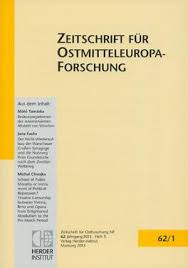Das Recht am geistigen Eigentum im Jugoslawien der Zwischenkriegszeit. Internationaler Institutionentransfer zwischen rechtlicher Normierung und sozialer Praxis
Introducing Intellectual Property Rights in Interwar Yugoslavia. The Transfer of International Institutions between Legal Standardization and Social Practice
Author(s): Augusta DimouSubject(s): Civil Law, Political history, International relations/trade, Interwar Period (1920 - 1939)
Published by: Verlag Herder-Institut
Keywords: Intellectual Property Rights; Interwar Yugoslavia; International Institutions between Legal Standardization and Social Practice;
Summary/Abstract: The article examines the introduction of copyright legislation in the kingdom of Yugoslavia after World War I. It was precisely in the context of this historical and political time frame and in conjunction with a second wave of internationalization at the beginning of the 20th century that the institution of intellectual property was legally anchored in the national legislations of the newly created nation states of Eastern and South-Eastern Europe. With a view to contemporary debates on intellectual property, the article argues for the utility of historical explorations into the “archaeology” (Michel Foucault) of copyright and proposes interwar Yugoslavia as a case study exemplifying the interplay between the internationalization of norms and their local adaptation. The article argues that social and cultural juridification processes involve more than the simple establishment of handling conventions; rather, they represent codification, standardization and institutionalization processes conducive to the social construction of reality. Finally, the article underscores the discrepancy between legal standardization and the social life of institutions, arguing that practice is less shaped by the institutions’ claims to universal validity but rather by the social, cultural and economic context in which institutions are embedded, and also by the power equilibrium and the interests characterizing the local and international actors involved in the field of culture.
Journal: Zeitschrift für Ostmitteleuropa-Forschung
- Issue Year: 61/2012
- Issue No: 3
- Page Range: 356-378
- Page Count: 23
- Language: German

